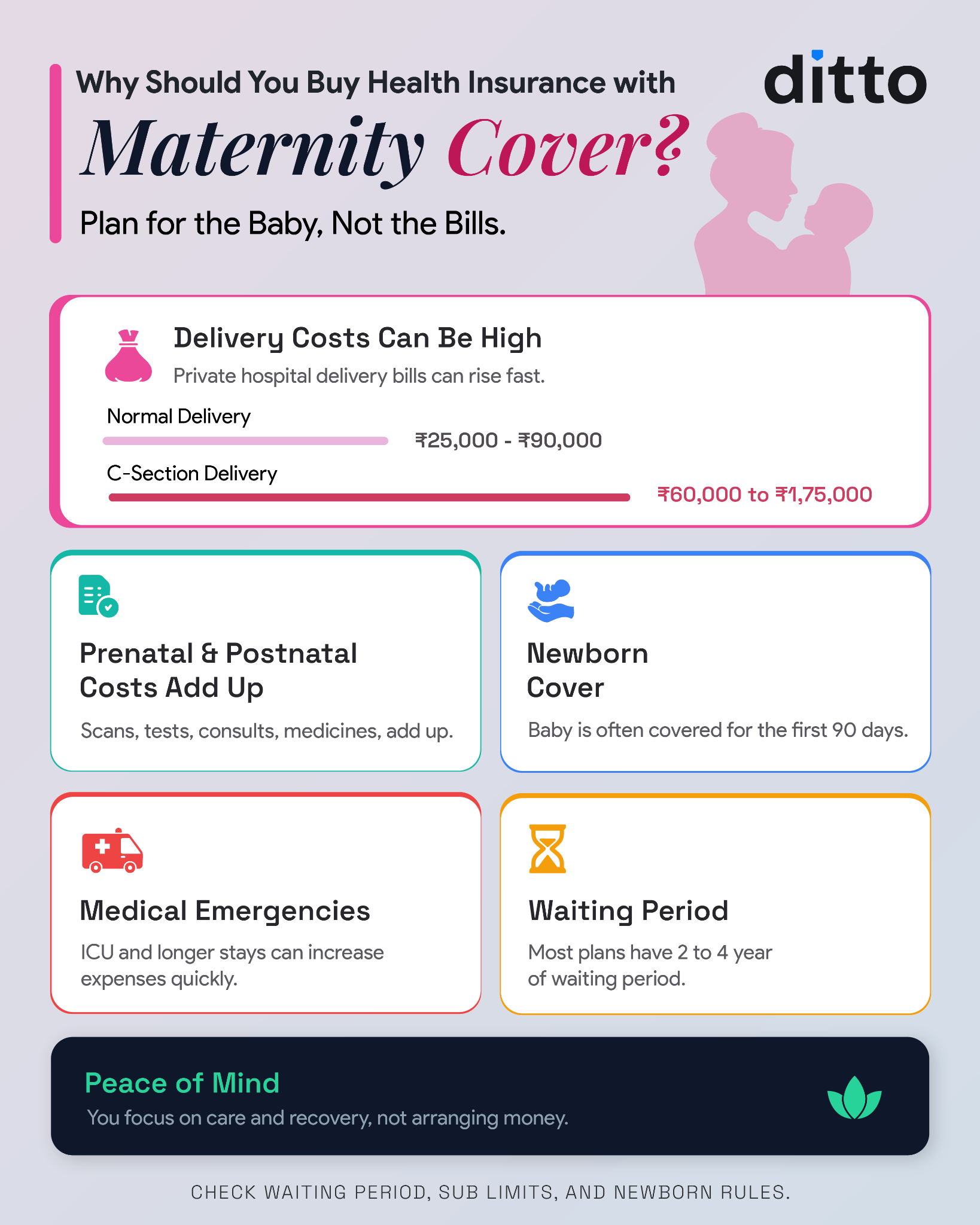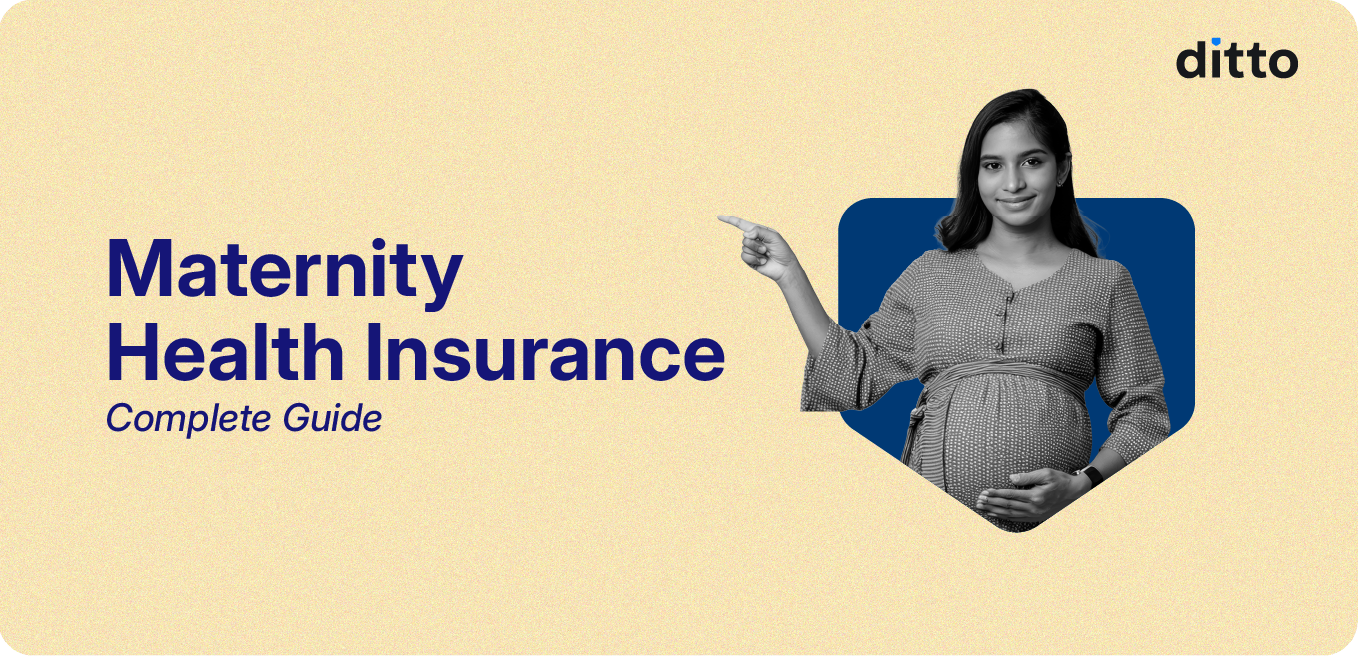Planning a baby is exciting. The surprise part is the hospitalization bill. Maternity data from India shows that about 1 in 5 births are C sections, and in private hospitals it is closer to 1 in 2. That is a big reason delivery bills can jump suddenly. This unpredictability is why planning ahead for maternity expenses matters.
Maternity health insurance is for pregnancy-related medical expenses, like delivery, pre and postnatal care, and sometimes newborn expenses. But here’s the catch: most standard health insurance plans do not include maternity coverage by default, and the benefits come with waiting periods and strict caps.
In this guide, we’ll explain how maternity cover works, how to get it, what to compare, how much it costs, common mistakes to avoid, and what Ditto recommends.
Health Insurance with Maternity Cover in India
Maternity can be covered in health insurance, but it’s usually not included automatically. Most regular plans don’t cover it by default. You either need a special plan that has an in-built maternity cover, or you add it as a maternity add-on.
Even when a plan offers maternity benefits, three things decide how much value you actually get:
Waiting Period
Maternity cover always has a waiting period, typically anywhere from 9 months to 4 years in retail policies. If you are already pregnant, most plans won’t help you.
Maternity Sub-limit
Maternity benefits come with a sub-limit, meaning the insurer will only pay up to a fixed amount for maternity, even if your total sum insured is much higher. And many insurers set different limits for normal delivery vs C-section.
Higher Premiums
Plans with maternity cover usually cost more. And because the benefit is capped, the extra premium you pay over a few years can sometimes be more than what you would have spent paying the delivery bill out of pocket.
For example, your policy might be ₹10 lakh, but maternity could come with a 3-year waiting period and a ₹75,000 cap for a C-section. Any amount above that cap is on you, even if your overall sum insured is much higher.
Benefits of Maternity Health Insurance
Lower Out-of-pocket Delivery Costs
Less Financial Stress During Admission
Coverage for Pregnancy Complications
Newborn Support
How Maternity Cover Health Insurance Works in India?
In-built Maternity Cover
This is a retail plan where maternity benefits are already included as part of the plan.
What to know:
- It usually comes with a waiting period.
- It usually comes with a maternity cap or sub-limit.
- It may include newborn coverage from day 1, but often under the maternity limit.
This route can make sense if you want a single plan that covers both regular health needs and maternity planning, and you are buying early enough to finish the waiting period.
Add-on Maternity Cover
Some insurers sell maternity as an add-on. You buy a regular health plan and pay extra to add maternity benefits.
What to know:
- Waiting periods still apply.
- These are “lifetime add-ons,” meaning once you add it, you usually cannot remove it later (and waiting periods may apply again if you re-add it), so treat it like a long-term decision.
- Mostly it only covers up to 2 deliveries, but you still keep paying for the add-on.
This is why it is important to do a quick cost versus benefit check, instead of assuming “add-on = good deal.”
Employer/Corporate Cover
This is the simplest answer for anyone looking for maternity health insurance without a waiting period.
What to know:
- Your employer health insurance covers maternity from Day 1.
- You do not pay any extra premium for this benefit.
- A maternity sub-limit still applies, so the payout is capped.
Employer cover can vary a lot by company, and you should check the fine print: maternity caps, room rent rules, network hospitals, and whether newborn expenses are included.
Factors to Compare Before You Buy
Waiting period and Your Timeline
If you are planning soon, the waiting period is the first filter. Many retail plans won’t help once pregnancy has already started.
Maternity Limit and C-section Cap
Your real payout is driven by the maternity cap, not the base sum insured. Always check separate limits for normal delivery vs C-section.
Whether Maternity Reduces the Main Sum Insured
In some plans maternity claims are paid from the base sum insured, which can reduce the cover available for other medical needs.
Network Hospitals and Room Rules
Even with maternity cover, room category rules and hospital network availability can impact final out-of-pocket costs.
Why Should You Buy Health Insurance with Maternity Cover?
To learn more about why you should buy health insurance with maternity cover, check out the infographic below:

Eligibility Rules to Watch Out For
Spouse and Family Definition
Some plans require both partners to be covered under the same policy for the benefit to apply, and adding a spouse later can reset eligibility.
Age Limits
Many plans restrict maternity cover to a specific age band (commonly 18 to 45). Always check the plan’s exact limits.
Continuous Coverage Matters
Maternity benefits work only if the policy stays active and continuous through the waiting period and delivery event.
Which Health Insurance Plans Cover Maternity? (2026)
Here are popular options if you’re checking which health insurance cover maternity in India.
Talk to an expert
today and
find
the right
insurance for you.

Features of Health Insurance Plans with Maternity Cover (2026)
Let’s see how each policy covers for pregnancy and delivery, where the fine print can catch you off guard, and what really affects your out of pocket costs, like waiting periods, maternity caps, C section limits, newborn coverage, and whether prenatal and postnatal expenses are actually usable.
So you are not just looking at a shortlist. You are also getting the why behind it, who each plan is best for, and what to check before you buy.
HDFC ERGO Optima Secure with Parenthood Add-on
Key Maternity Benefits
- Add on maternity cover with a separate Parenthood sum insured of ₹50,000, ₹1,00,000, ₹1,50,000, or ₹2,00,000
- Covers prenatal and postnatal medical expenses for 180 days before and 180 days after childbirth
- Covers IVF expenses for the listed steps, limited to the first or second IVF cycle in the insured person’s lifetime
- Covers embryo freezing and storage expenses
Key Maternity Drawbacks
- A 24 month waiting period applies for any claim under this add on
- Lifetime cap: at most 2 deliveries or 2 lawful terminations, or 1 delivery and 1 termination
- No newborn baby coverage under this add on
- Delivery, IVF, and embryo storage are all covered only within the Parenthood sum insured
- Prenatal and postnatal expenses are paid only if the maternity hospitalization claim is accepted
- You can add it only at inception or renewal; if you opt out and later opt back in, the waiting period applies again
- It requires at least one female insured person aged 18 or above in the base policy, otherwise the add on is not available.
Aditya Birla Activ Fit Preferred
Key Maternity Benefits
- In built maternity cover that pays over and above the base sum insured, so maternity claims do not reduce your main cover
- Covers normal delivery, C section, and lawful medical termination, up to 2 lifetime events per insured person
- Covers newborn inpatient expenses for up to 90 days after birth, within the maternity limit
- Covers newborn vaccinations up to age 2 years
- Covers one time stem cell harvesting and storage for the newborn, within the maternity limit
Key Maternity Drawbacks
- Low maternity cap: ₹40,000 per normal delivery event and ₹60,000 per C section event, including delivery, newborn expenses, vaccinations, and stem cell storage
- Default maternity waiting period is 36 months
- Maternity is available only if you and your spouse are both covered under the same policy
- Prenatal and postnatal costs are covered only within the maternity benefit, and the base policy’s standard pre and post hospitalization cover does not apply here
- Stem cell harvesting, vaccination and newborn benefits are tied to an accepted maternity claim, so they do not work as standalone benefits
- Plan is available for purchase only up to the age of 45
Niva Bupa Aspire Titanium +
Key Maternity Benefits
- In built family planning benefit called M-iracle that covers prenatal check ups, select vaccines for the expecting mother, and delivery, including normal delivery and C section
- M-iracle also covers surrogacy related delivery, assisted reproduction and infertility treatment like IVF, ICSI, GIFT, and ZIFT, plus legal adoption related expenses
- Newborn baby can be covered from day 1 once added to the policy
- It also pays up to ₹10,000 for tests conducted on the child at the time of adoption
- M-iracle waiting period is 9 months
- M-iracle has its own sum insured linked to your base sum insured, and any unused amount carries forward and stacks up over time like a bonus. For example, if your M-iracle limit is ₹10,000 per year and you do not claim for 3 years, you can have ₹30,000 available
- Maternity claims do not impact the age lock benefit under Lock the Clock+
Key Maternity Drawbacks
- M-iracle can start small each year because it is tied to the base sum insured, roughly ₹4,000 to ₹25,000 per year, so it often takes multiple claim free years to build into a meaningful maternity payout
- Maternity complications are paid only from the M-iracle sum insured, not from the main base sum insured
- The biological mother must be insured under the policy, except in surrogacy or legal adoption cases
- Vaccine cover is limited to a defined list for the expecting mother, it is not a blanket vaccination benefit
ICICI Lombard Elevate with Maternity Add-on
Key Maternity Benefits
- Maternity is available as an optional cover
- Maternity payout is up to 10% of your sum insured, capped at ₹1,00,000 per delivery event
- Includes prenatal and postnatal expenses within the maternity limit
- Optional newborn hospitalization cover pays up to 2 times the maternity limit for up to 90 days from birth, but only if the maternity claim is accepted and the baby is hospitalized for at least 24 hours
- Optional newborn vaccination cover pays up to 1% of sum insured, capped at ₹10,000 in the first year, but only if both covers are opted and the maternity claim is accepted
- Bonus: separate inpatient cover for complications of a surrogate mother or oocyte donor, up to ₹5,00,000 each
Key Maternity Drawbacks
- Default maternity waiting period is 24 months
- You can reduce it to 12 months only by opting for the waiting period reduction option along with maternity, and you must keep it for 2 continuous policy years
- Maternity is available only if both you and your spouse are covered in the same floater
- Lifetime cap of 3 deliveries or terminations per insured female.
- Postnatal cover is limited to 30 days after delivery, within the maternity limit, and only for inpatient expenses
Reliance Health Infinity with Maternity Add-on
Key Maternity Benefits
- Optional add on called Mother and Child Care that includes maternity cover plus newborn and vaccination cover
- Choice of 12 month or 24 month maternity waiting period
- Covers prenatal inpatient expenses from conception to childbirth and postnatal inpatient expenses for 1 month after delivery or termination, within the maternity limit
- Pays prenatal and postnatal OPD expenses up to ₹10,000, only if the maternity claim is accepted
- Newborn cover pays inpatient or day care expenses from birth to 90 days, but only if the maternity claim is accepted
- Covers the cost of listed newborn vaccines up to 90 days, such as Hep B, Rotavirus, and DTaP
- Maternity limit is ₹1,00,000 at ₹5,00,000 sum insured, and at ₹10,00,000 and above you can choose ₹1,00,000 or ₹2,00,000 as the maternity limit
Key Maternity Drawbacks
- The add on is available only with a 3 year policy term
- Maternity cover applies only to female members aged 18 to 45
- Lifetime cap of 2 deliveries or terminations per insured person
- Maternity claims are paid from the base sum insured, so they reduce the cover available for other hospitalizations
Note: Premiums for a ₹15 lakh S.I., residing in Delhi - 110010, including necessary and mandatory add-ons. Exact premiums can vary depending on city, underwriting, discounts, and insurer repricing.
Premium Comparison of Health Insurance with Maternity Cover
What’s Covered and Not Covered in Maternity Health Insurance?
It’s worth noting that coverage and exclusions may vary across insurers and plans. Please check the brochures and policy wordings of the specific plan you are interested in carefully.

Common Mistakes to Avoid While Choosing Maternity Health Insurance
Check Employer Cover
Employer group plans often cover maternity from Day 1, so paying extra for a retail add on may be unnecessary. First check the maternity cap and terms in your corporate policy, then buy a personal plan only to cover the gaps.
Buying Late
Most maternity benefits come with long waiting periods. If you buy after you start trying, you will likely miss the window when you actually need the cover.
Check Maternity Sub-limit Carefully
A high sum insured does not mean a high maternity payout. Always check the maternity sub-limit for normal delivery vs C section, because that number decides your real out of pocket cost.
Eligibility
Many plans require both partners to be on the same policy for the full waiting period. If you add your spouse later, maternity eligibility may reset and you may have to wait again.
Choosing Right Plan
If your plan has room rent limits or your hospital is not in the insurer network, your final bill can jump even if maternity is covered.
Why Talk To Ditto For Health Insurance
At Ditto, we’ve assisted over 8,00,000 customers with choosing the right insurance policy. Why customers like Abhinav below love us:

- No-Spam & No Salesmen
- Rated 4.9/5 on Google Reviews by 15,000+ happy customers
- Backed by Zerodha
- Dedicated Claim Support Team
- 100% Free Consultation
You can book a FREE consultation here. Slots are filling up quickly, so be sure to book a call or chat on WhatsApp with us.
Ditto's Take on Maternity Health Insurance
When it’s worth it:
If your employer plan covers maternity from Day 1 and the maternity cap is decent, that is usually the best place to start. It costs you nothing extra and you can use it immediately. A retail maternity cover makes sense only if you are planning early enough to finish the waiting period and the maternity cap is high enough to meaningfully reduce your expected bill.
When you should skip it:
Skip a retail maternity add on if the extra premium over a few years is likely to be more than the maternity payout you can realistically claim. This happens a lot because maternity benefits are capped and often usable only a limited number of times. Also skip it if you are already pregnant, because waiting periods make most retail maternity covers unusable.
The simplest “safe approach” for most couples:
First, get a comprehensive base health insurance plan that you would still want even if maternity did not exist, strong hospital coverage, fewer restrictions, and reliable claims. Then, treat maternity cover like an add on decision. Use your employer plan if it is available, and if you are considering retail maternity, do a simple cost to benefit check based on the waiting period and the maternity cap, not the base sum insured.
Quick Note
Frequently Asked Questions
Why People Trust Ditto
Last updated on:




